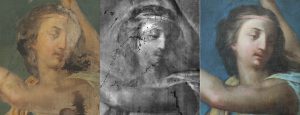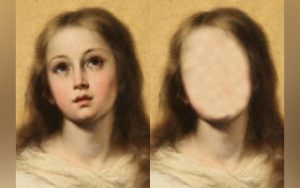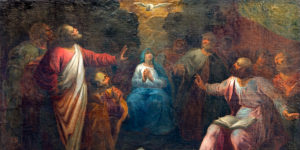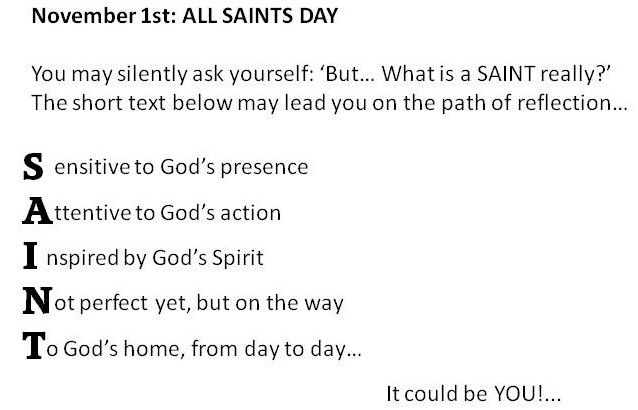We celebrate today the feast of all the saints – those well known and those perhaps not as familiar to us.
As we remember this particular saint, and that other, and others still,
we may stop thinking of them and start looking at our own lives.
And as we do, we may think that… we are not as holy as they are.
Not as patient, as humble, as prayerful, as faithful to God.
Not as generous, not as…
and our list gets longer mentioning all the qualities that we believe make a saint.
We may become dispirited and discouraged,
all the while forgetting the most important: what WE ARE.
The text of the 2nd reading says it clearly:
“Children of God! … that is what we are!
We have been created in God’s image – an image that cannot be erased or obliterated.
But… it can be damaged, the face of God in us can be… defaced,
yes, when we refuse to behave as his children.
But this is NOT the end of the story, God is always ready to restore his image in us.
 There are people especially skillful in picture or image restoration.
There are people especially skillful in picture or image restoration.
A famous painting or a family picture may have been damaged but can be restored.
I personally believe that God’s Spirit present in us is a specialist in… image restoration!
The text of the 2nd reading goes on with these words:
What we will be has not yet been made known. 
But we know that… we shall be like him.” (1 Jn.3:1-3)
We are, in fact, saints-in-the-making, nothing less!
Note: Another reflection on a different theme in French can be found at: https://image-i-nations.com/fete-de-la-toussaint-annee-a-2020/
 “A sound like the blowing of a violent wind came from heaven;
“A sound like the blowing of a violent wind came from heaven;

 This is the meaning of the apostle Paul in the 2nd reading of this Sunday (5th Sunday, Year A).
This is the meaning of the apostle Paul in the 2nd reading of this Sunday (5th Sunday, Year A).



 When told that something is free, or at a big discount, some people will rush to benefit from the offer.
When told that something is free, or at a big discount, some people will rush to benefit from the offer. We pretend that we can ‘handle it’, we can manage on our own.
We pretend that we can ‘handle it’, we can manage on our own. On today’s feast of Pentecost we, too, are meant to welcome God’s own Spirit.
On today’s feast of Pentecost we, too, are meant to welcome God’s own Spirit.